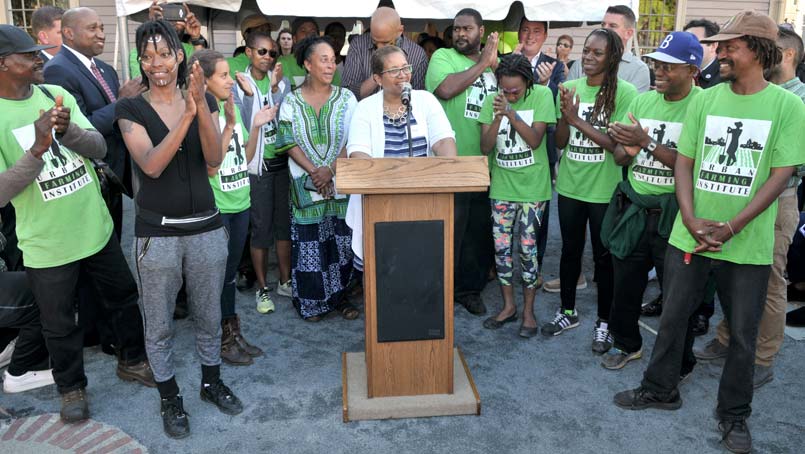
29 Jun Fowler Clark Epstein Farm is Open!
Mayor Martin J. Walsh and Historic Boston Inc. and its three partners, Urban Farming Institute, Trust for Public Land and North Bennet Street School, celebrated the opening of a 21stcentury urban farm, residence, and teaching center at the Fowler Clark Epstein Farm on June 25thwith more than 500 guests.
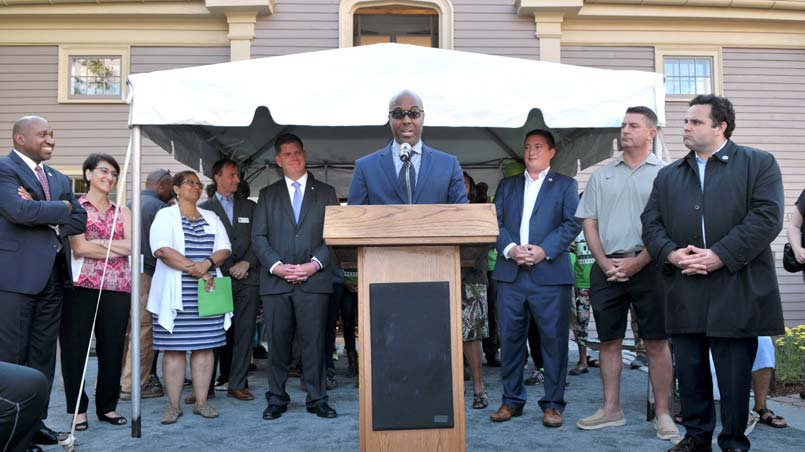
Mayor Walsh thanked the partners, whose staffs were crowded along with visitors among the rows and rows of produce already sprouting from the rich soil beds.
“What we’re looking at – the community helped shape the vision,” he said. “What you see here is history, what you see here is public health, what you see here is open space, what you see here is job training, and it’s all come together in a community opportunity in an inclusive model.”
“This community is full of pride,” Walsh added. “It’s important to have this as a symbol of Boston’s future, and that’s why we thought it was important to restore it.
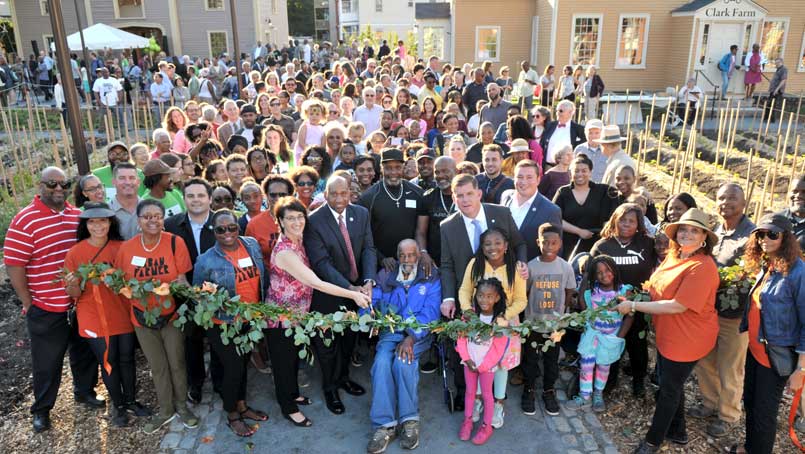
The restoration project cost about $3.7 million. HBI and partners raised about $1.4 million from 20 foundations and other contributors. Many of the contractors and professionals worked on the project a no cost or for reduced fees.
“From the ground up, many have made this possible,” said Nataka Crayton Walker, UFI’s resident farmer at the farm, at 487 Norfolk St., “and many more hands will make this grow and blossom. This place today goes from a historic farm to being a 21stcentury modern farm.”
Urban Farming Institute now occupies and is operating the farm. About $300,000 still needs to be raised to erect a greenhouse, so the farm can operate year-round.
“When I first got elected, this was the place where everyone in the neighborhood just came over and dumped in,” said State Rep. Russell Holmes. “We cleaned it up. The neighborhood felt this was unacceptable, and it was. Folks are going to live in these buildings. The young adults are going to teach in these buildings.”
Patricia Spence, Executive Director of the Urban Farming Institute, repeated the organization’s slogan – “We don’t just grow food, we grow people” – and recalled her grandparents, from Jamaica, came to Boston and grew food.
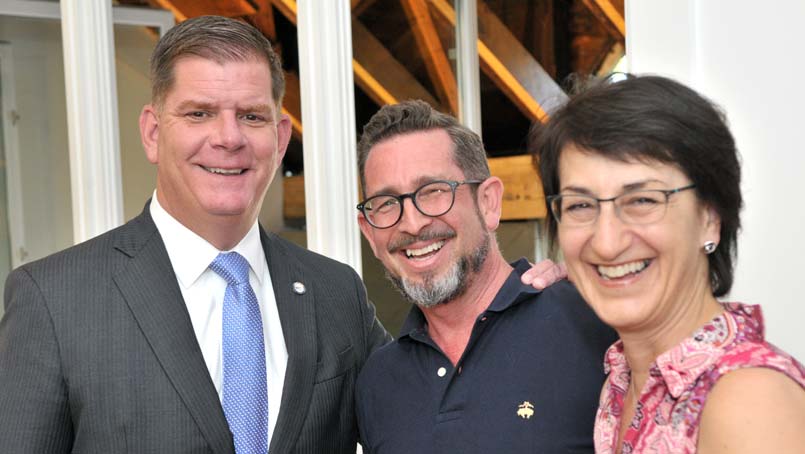
“This is to help us heal our community, bring our community together and help us help each other,” she said. “We present to you a healing landscape as well.”
“We’re creating farm entrepreneurs,” she said. “And you’ll be able to buy your food right here at our farm stand on Fridays.”
Kevin Essington, Massachusetts Director of Trust for Public Land, said, “This is Boston’s newest urban farm, within a 10-minute walk of 7,348 Bostonians. I know deep down that urban farming in Boston changes lives.”
The Trust for Public Land also announced that it had raised $1.2 million to build five new urban farms in Boston, Essington said. “The Fowler Clark Epstein Farm is already becoming a keystone of the neighborhood.”
Cheis Garrus, a member of the HBI Board of Directors, noted that, “Historic Boston Inc. redevelops historic buildings for contemporary needs, and Fowler Clark Epstein Farm is a perfect example.”
“This is only the beginning of what will undoubtedly be a bright future for Urban Farming and the rich history of this neighborhood” he said.
The event marked the completion of the 18-month rehabilitation and redevelopment of the 1860s-era barn and house.
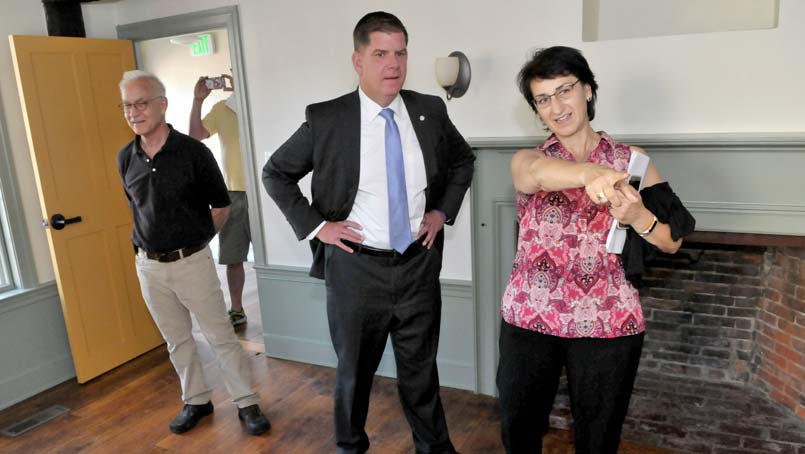
In January 2017, contractors began replacing the roof, repairing the barn’s structure, and inserting steel structure so that it could withstand winter weather and be ready for the next phase of work. Work on the house on the property began in the spring of 2017.
M.J. Mawn, Inc. of East Walpole did the building construction. Hurst Landscaping & Site Services, a Mattapan contractor, did the extensive landscaping. The farm site is recognized as a City of Boston Landmark and is eligible for listing on the National Register of Historic Places.
The Fowler Clark Epstein farm, named for a succession of family owners, is located on a 30,000-square-foot site. The barn, which served as a stable, is about 40 by 25 feet in size with two floors and a basement. Many of the clapboards on the barn are thought to be original.
In addition to serving as Urban Farm Institute headquarters, the property is a training hub and demonstration farming center. The institute is devoted to advancing commercial urban farming in Boston through land development, technical training, and education of urban farming professionals.
Rehabilitation included land and open areas cultivated for local food; classrooms for educational programs and a residence for an on-site farm manager in the historic house; an education/training center that promotes urban farming knowledge with classrooms, a demonstration kitchen and offices in the carriage barn for both farmers in training and public programs about farming and food production; a future greenhouse to extend the New England growing season; and a future farm stand with fresh produce.
The project was funded partially through state historic rehabilitation tax credit and federal historic tax credit proceeds. HBI worked with Vanasse Hangen Brustlin, Inc. (VHB) a historic consultant, on the federal and state historic tax credit applications, which included the National Register nomination. The acquisition of the credits would not have been possible without the substantial staff hours that were donated to the successful completion of the project.
Contributors included the Amelia Peabody Charitable Fund, Barbara and Amos Hostetter, The Trust for Public Land, the City of Boston Department of Neighborhood Development, the Edward Ingersoll Browne Fund, the George B. Henderson Foundation, The 1772 Foundation, the Cabot Family Charitable Trust, the Harold Whitworth Pierce Charitable Trust, the Clipper Ship Foundation, the Eastern Bank Charitable Foundation, and the Paul and Edith Babson Foundation.
Built sometime between 1786 and 1806, the original farmhouse was once part of a large Dorchester farm encompassing more than 330 acres dating back into the 17thcentury. It is Mattapan’s oldest structure. Although five families have passed through the house across its 200-year history, it has primarily been owned by three families, beginning with Samuel Fowler, a Dorchester yeoman in the late 18th century.
In 1837, the property was sold to the Clark family. It was eventually subdivided into parcels, as advancements in transportation hastened the development of Mattapan as a street-car suburb of Boston. However, more than half an acre of land was preserved within the densely developed residential neighborhood, and the original house and barn were sold to Jorge Epstein in 1941, remaining in the family’s possession until falling vacant in 2013.



